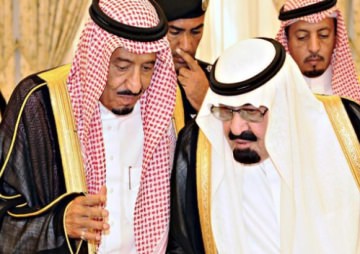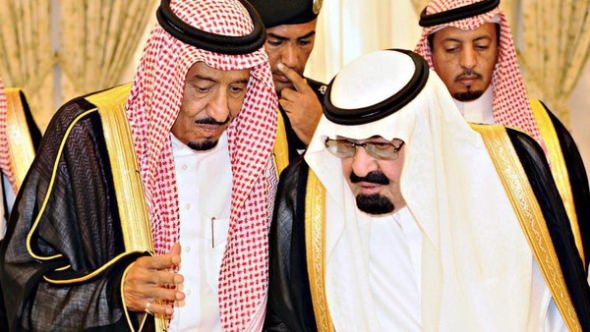New Saudi King to Obama: Lower-Price Oil Policy Won’t Change
That Saudi Arabia is treated with kid gloves only has one explanation: It pumps over 10 percent of the petroleum produced daily in the world.

The new Saudi monarch, King Salman, left, with his half brother King Abdullah, who died this month. Tribes of the World (CC BY-NC-SA 2.0)
This post originally ran on Juan Cole’s Web page.
President Obama cut short his India trip to head off to Riyadh in the wake of the death last Thursday of King Abdallah of Saudi Arabia. Some 30 members of the Washington elite came along, of both parties, including Sen. John McCain and Rep. Nancy Pelosi. This love fest underlined the close relations between Saudi Arabia and the United States, which are nearly as important for US Middle East policy as Washington’s special relationship to Israel.
Saudi Arabia gets special treatment from the US, with its arbitrary, absolute monarchy and extensive human rights abuses never being openly condemned by the US government. Iran, which for all the extensive faults of its theocratic government, is substantially freer than Saudi Arabia, is constantly hectored about its authoritarianism and attempt to export a radical form of Islam. But Saudi Arabia is held harmless in D.C. simply by never being brought up in this context. When asked by Fareed Zakaria about this issue of Saudi human rights, Obama took refuge in the close security cooperation between the two countries. He also maintained that the US does pressure Riyadh behind the scenes. But the US routinely complains about invidious policies pursued by European allies out in the open. That Saudi Arabia is treated with kid gloves only has one explanation: It pumps over 10 percent of the petroleum produced daily in the world.
One issue they discussed was the plummeting of oil prices, which is badly hurting North Dakota, where expensive hydraulically fractured petroleum may not be viable at $50 a barrel or less. US oil companies sent stock prices down in the US today by declining to buy new equipment from companies like Caterpillar, which took a hit. Saudi Arabia could put at least some upward pressure on prices by simply pumping a bit less petroleum daily.
But King Salman refused to change the current policy, of allowing the price of petroleum to fall dramatically rather than giving up Saudi oil market share. Saudi Arabia can just cut back on its infrastructure projects and spend less, and it anyway has an enormous surplus of some $750 bn in foreign currency reserves and another equally large sum available for foreign investments. The Saudis may lose $100 billion this year from budget shortfalls, but that sum can be cut if the low prices last (they will probably be with us for at least 3 years).
Obama and Salman also talked about the collapse of Yemen, about Daesh (ISIL) in Iraq and Syria, and about US talks with Iran over its nuclear energy program. CCTV reports, below, that the US is playing down the links of the Zaidi Shiite Houthi movement in Yemen with Iran, while the Saudis see the Houthis as in Iran’s back pocket. As usual in Riyadh, the substance of the rest of what they said to one another could only be speculated on.
But one thing is clear: the Washington-Riyadh political alliance is extremely powerful.
—-
Related video added by Juan Cole:
CCTV: “Obama honors late Saudi King Abdullah; meets with King Salman”
Independent journalism is under threat and overshadowed by heavily funded mainstream media.
You can help level the playing field. Become a member.
Your tax-deductible contribution keeps us digging beneath the headlines to give you thought-provoking, investigative reporting and analysis that unearths what's really happening- without compromise.
Give today to support our courageous, independent journalists.






You need to be a supporter to comment.
There are currently no responses to this article.
Be the first to respond.